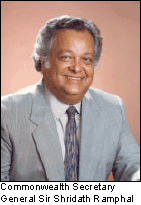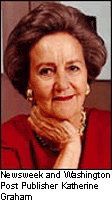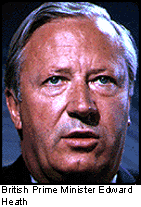|
|
The Brandt Equation: 21st Century Blueprint for the New Global Economy
About the Brandt Commission
|
|
On January 14, 1977, Robert McNamara, the president of the World Bank, announced the idea of establishing a commission of experienced, respected politicians and economists. He proposed that the members of this new international panel should not be official representatives of governments, but would work independently to formulate 'basic proposals on which global agreement is both essential and possible'. The commission was to make recommendations on ways of breaking through the existing international political impasse in North-South negotiations for global development. |
| |
| Willy Brandt was asked to preside over the commission, which was to be equally represented by the developed North and the developing South. Through various discussions, Brandt carefully shaped the commission so that it would be met with collaboration, rather than opposition, by North and South alike. |
| |
| On September 28, 1977, Brandt announced that he was prepared to form and chair an 'Independent Commission on International Development Issues'. The Brandt Commission was to be autonomous, would not interfere with ongoing international negotiations, and would make recommendations to help improve the climate of North-South relations. In composing the membership of the Commission, Brandt wanted it to represent as many views and interests, and as much political and regional balance as possible. Brandt's idea was that a majority of partners would be from developing countries, including representatives from both the Left and Right, women, a prominent industrialist, and a trade representative. |
|
 |
| |
Although no members of the Commission were from communist nations, Brandt did discuss the Commission's work with Eastern European Party members, as well as the Soviet and Chinese leadership. Brandt's decision not to invite members from the communist world was based upon the consideration that those nations were slowly moving towards greater involvement in North-South negotiations, and he did not want to force them into taking a premature position.
The first session of the Commission was held from December 9-11, 1977, at which the Commission's terms of reference and a working agenda were agreed upon. The concept of 'mutual interest', it was agreed, would be central to the reports, influencing international political attitudes toward greater cooperation. |
 |
|
|
The Commission was supported by a Secretariat that consisted of specialists on various development problems. Almost all of the staff had previous experience with the World Bank, and all were well aware of the type of proposals that would be needed to achieve successful and viable development programs at the international level.
The Commission's purpose was to influence public opinion to help change government attitudes, as well as to make proposals for revitalizing North-South negotiations. |
| |
Broadly speaking, the Brandt Commission's reports gave new life to earlier North-South proposals by placing them in a new context, which emphasized a dual relationship: the northern nations dependent on the poor countries for their wealth, and the poor countries dependent on the North for their development.
The Brandt Commission's two reports, North-South (1980) and Common Crisis (1983) give primary emphasis to the international issues of food and agricultural development, aid, energy, trade, international monetary and financial reform, and global negotiations. The Brandt Reports also sought solutions to other problems common to both North and South, including the environment, the arms race, population growth, and the uncertain prospects of the global economy. Since these problems ultimately concern the survival of all nations, the Brandt Commission's recommendations were presented as a structural program to address the world's problems collectively.
There were two phases to the Brandt Commission's work. The Dutch Government enabled the Commission's preparatory work, financing about half of the total expenditure. The governments of Denmark, Finland, India, Japan, Republic of Korea, Norway, Saudi Arabia, Sweden and the United Kingdom joined in with substantial untied contributions. Regional organizations and Funds, such as the Commission of the European Communities and the OPEC Special Fund assisted. |
| |
| So did the Foundations and Research Centers such as the German Marshall Fund of the United States, the Ford Foundation, the Friedrich-Ebert and the Friedrich-Naumann Foundation of the Federal Republic of Germany, and the International Development Research Center of Canada. Private sources from France and the Federal Republic of Germany also contributed smaller amounts. All of this financing enabled the Brandt Commission to discuss, write, and produce the report, North-South: A Program for Survival. The governments of Denmark, the Netherlands, Norway, Sweden, United Kingdom, and the OPEC Fund supported follow-up activities after the publication of North-South. |
|
 |
| |
The conferences which produced the Brandt Commission's second report, Common Crisis: North-South Cooperation for World Recovery, were funded separately. The governments of Canada, the Federal Republic of Germany, the Netherlands, Kuwait, and the Commission of the European Communities paid for travel to and local costs at the meetings of the second round. The German Marshall Fund of the United States supported some additional follow-up for the distribution of Common Crisis.
Phase one cost about $750,000 and phase two about $350,000 – total cost: $1,100,000 (US). |
|
|
|
|
|
|
|
|

